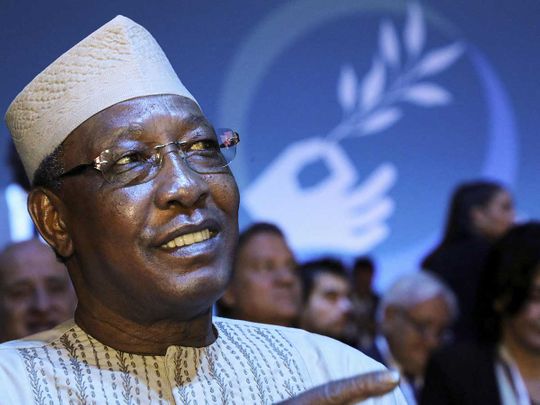
Paris: The death of Chad’s veteran strongman leader Idriss Deby Itno has thrown the future of the country and the wider battle against jihadist groups in the Sahel region of northern Africa into doubt.
A look at the big questions a day after the army announced his demise:
How did Deby die?
According to the army, Deby died from injuries sustained on the frontline while commanding his forces in the north of the country as they attempted to repel an incursion by anti-government rebels based in Libya.
Such behaviour from Deby, a veteran soldier, was not unusual for a man whose power and mystique was founded on his military prowess, observers say.
“My understanding from talking to people on the ground was that he was deeply concerned that rebels were advancing on the capital,” Cameron Hudson, a Sahel expert at the Atlantic Council think-tank in Washington, told AFP.
“He went to the front... to motivate and speak to his troops,” he added.
The Jeune Afrique magazine also reported this version of events.
Given the tribal and intra-family rivalries in Chad, coupled with a culture of secrecy in the army, an assassination was initially viewed as a possibility.
Who is in control now?
The army announced that a military council, led by the late president’s 37-year-old son and four-star general Mahamat Idriss Deby Itno, would replace Deby who had ruled since a 1990 coup.
“We support a peaceful transition of power in accordance with the Chadian constitution,” said the US State Department.
On Wednesday, it was announced that Deby’s son will “occupy the functions of the president of the republic” and also serve as head of the armed forces.
The death comes after a highly contested presidential election on April 11, which was officially won by Deby after a campaign marked by severe intimidation of his opponents.
“Anything is possible, including the worst,” said Marielle Debos, a leading French expert on Chad at the University Paris Nanterre. “It’s a very tense situation.”
Some observers say that Deby’s son will have difficulties stepping into the shoes of his father.
What about the rebels?
The rebels who the army said killed Deby are from the FACT group - the Front for Change and Concord in Chad (FACT) - which launched a major incursion on the day of the presidential election.
The rebels are based in Libya.
The location of Deby’s death - in the Kanem region - indicates they had travelled hundreds of kilometres inside Chad from the northern border, travelling in heavily armed pick-up trucks.
The Chadian army claimed it had “destroyed” the rebels after more than a week of fighting.
But the rebels issued a statement on Monday saying they were moving on to the capital N’Djamena.
“An immediate ceasefire is crucial,” said Thibaud Lesueur from the International Crisis Group think-tank.
How will France, the West react?
France is the leading international power locally due to its colonial history in Chad, while the United States has a more limited military presence in the wider region.
Paris has 5,100 troops as well as air power stationed permanently in the Sahel region as part of its operation Barkhane, which is headquartered in the Chadian capital.
The French presidency paid tribute to Deby as a “courageous friend” and “great soldier” on Monday.
France has used its air power to back up Deby’s forces on multiple occasions, most recently in February 2019 when it carried out air strikes against UFR rebels advancing from Libya.
Paris will have to weigh up whether to intervene again to support the new regime if FACT rebels continue their advance.
What about the wider region?
The Sahel, comprising Burkina Faso, Chad, Mali, Mauritania and Niger - is a vast semi-arid region that stretches along the southern rim of the Sahara desert.
It is a haven for armed groups from Boko Haram in Nigeria to offshoots of Al Qaida and the Islamic State group.
Deby’s troops were crucial and effective firepower in both a UN peacekeeping effort and a still shaky force comprised of soldiers from the five Sahel countries, known as the G5 Sahel.
“In the event of internal trouble, Chad will be obliged to call back all of its soldiers overseas and this could destabilise the whole region,” said Amadou Bounty Diallo, a professor at the University of Niamey in Niger.








